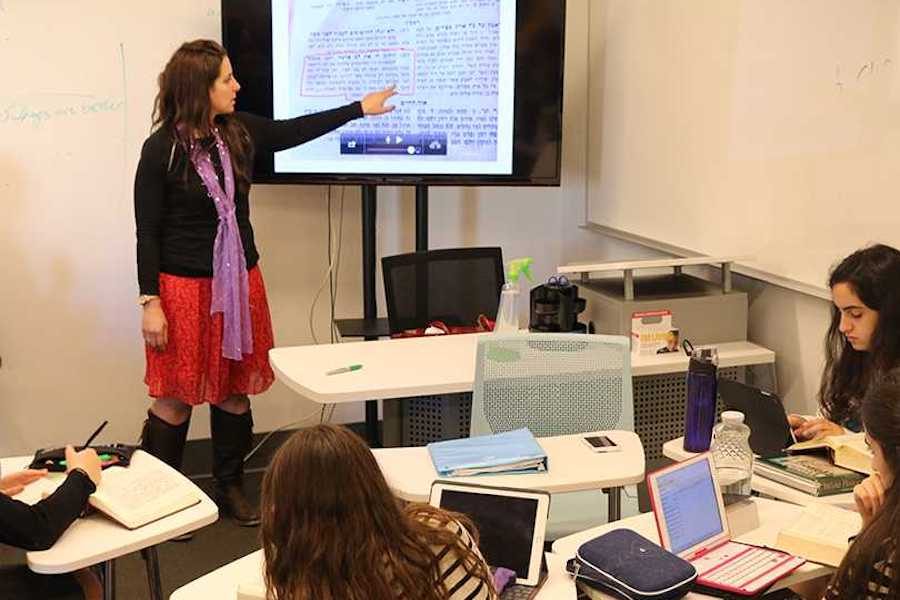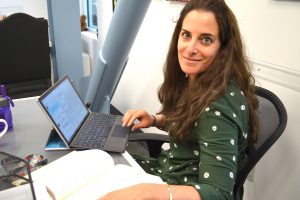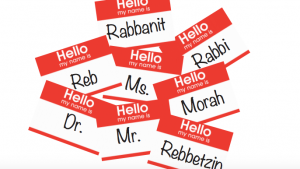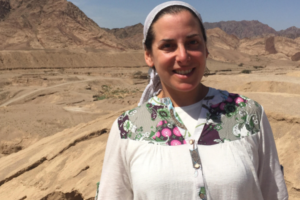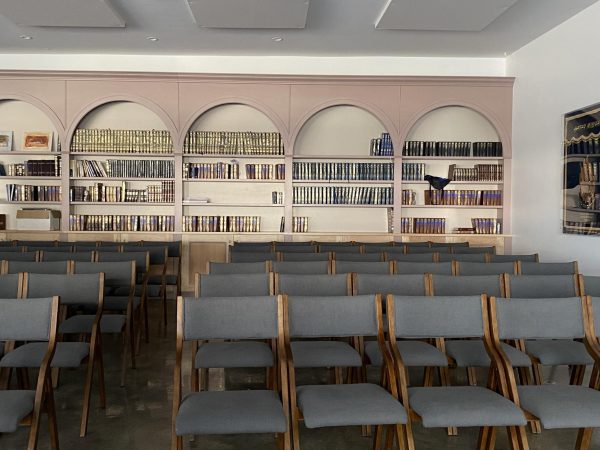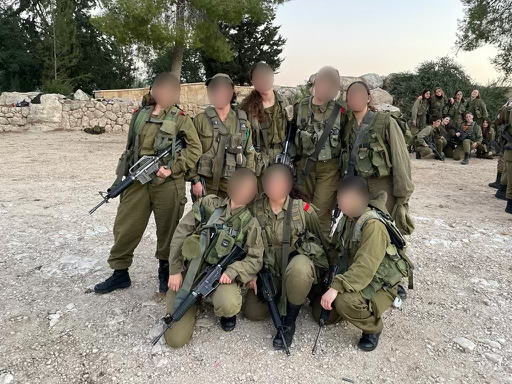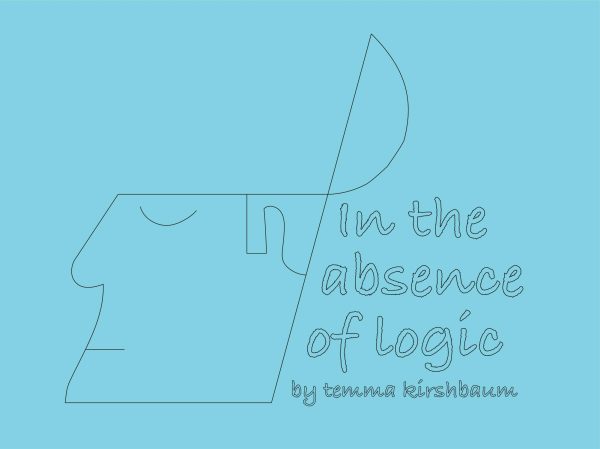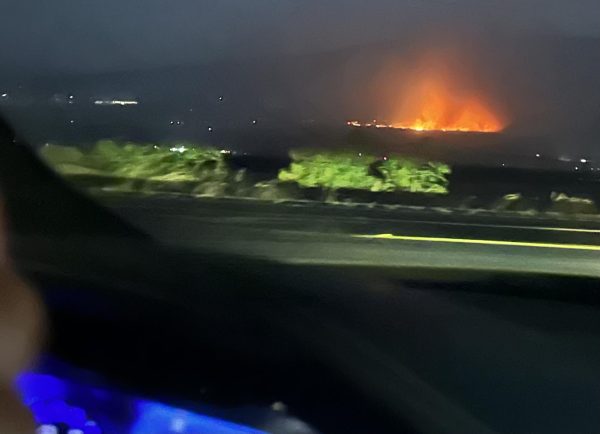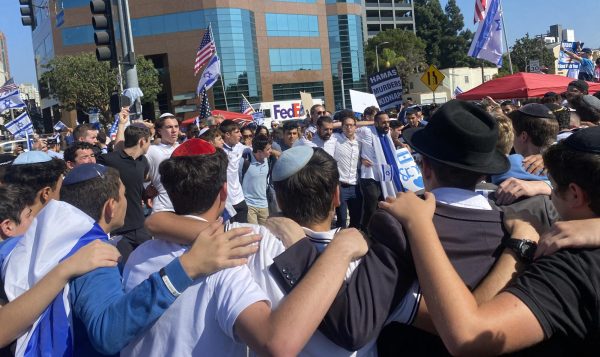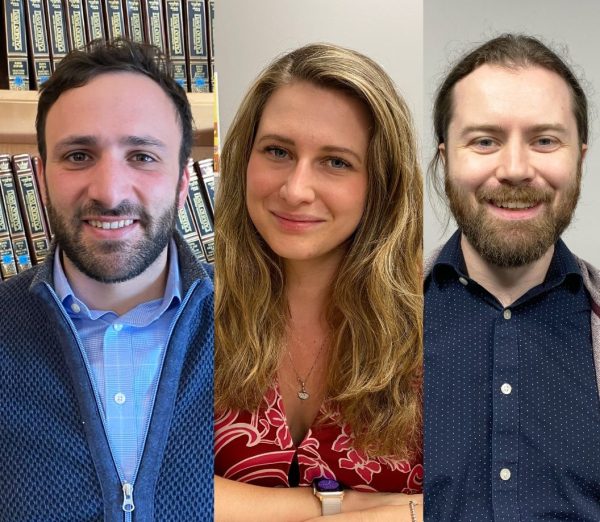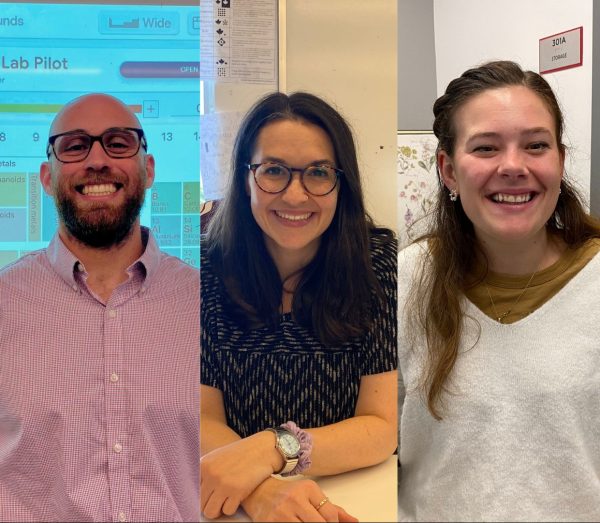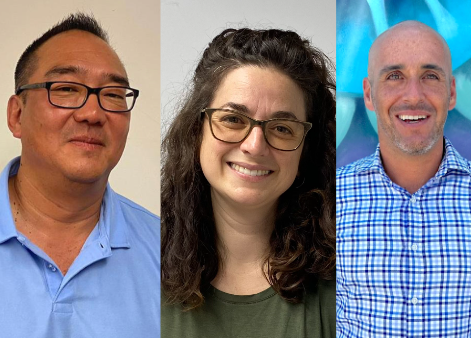Her training completed, Yoetzet Segal finds new ways to teach and relate to students, female and male
ROLE: Ms. Atara Segal plans to be a role model for both boys and girls.
This story won a Best of SNO award.
Last month in Israel, Ms. Atara Segal, who has been teaching Tanakh, Talmud, and Statistics for seven years, completed training and passed her exams to become a yoetzet halacha — literally, an adviser in Jewish law, but used to designate a woman who is rabbinically certified to make halachic decisions on matters relating to women’s bodies and intimacy in marriage.
Yoetzet Segal said students can approach her with questions or concerns about the mikvah, sex or periods.
But that’s not the main effect she expects her training to have at Shalhevet.
Rather, she said her newly acquired knowledge would enhance her teaching, and that her status and title sends a message about Jewish religious interest in sex, while breaking boundaries for women at Shalhevet.
“Just having broader knowledge always makes somebody a better teacher,” Ms. Segal said in an interview. “My skills have improved because I spent so much time following a sugya,” or rabbinic legal dilemma, “from the earliest sources to the most modern.
“I saw so many examples of, for example, how a machloket [dispute] between Rashi and Tosfot suddenly becomes relevant in the 20th century as new technology is developed,” she continued. “It helped me become more sensitive to the practical implications of different understandings of the Gemara.”
In addition, she expects her presence on campus — and the knowledge that she is an expert on Jewish law pertaining to marriage, called taharat hamishpacha — to be important even to those who never ask a question.
“A big part about teenage life is sexuality and relationships,” Yoetzet Segal said. “Knowing there is a Judaic approach to relationships and to biology and to reproduction is also very very important.”
For that reason, she said, her work also applies to boys.
“The nitty-gritty details of halacha may be less interesting or relevant to a high school boy, but I think there are fundamentals that are important,” Yoetzet Segal said. “It’s fundamentally important to know about the sex ethics of Judaism.”
[edsanimate_start entry_animation_type= “shake” entry_delay= “0” entry_duration= “1” entry_timing= “linear” exit_animation_type= “” exit_delay= “” exit_duration= “” exit_timing= “” animation_repeat= “1” keep= “yes” animate_on= “scroll” scroll_offset= “50” custom_css_class= “”]
“
A big part about teenage life is sexuality and relationships. Knowing there is a Judaic approach to relationships and to biology and to reproduction is also very very important.
— Ms. Atara Segal, Mashgicha Ruchanit
[edsanimate_end]
Rabbi David Block, Assistant Principal for Judaic Studies, said Yoetzet Segal’s new certification would set an example about women’s learning.
“It means that we have someone on our staff who is really an expert in a lot of areas of halacha, of Jewish law,” Rabbi Block said, “and someone who is a resource, a resource to students, resource to really everyone. And also, someone who is modeling high level talmud Torah,” or Torah study, “to all of our students — certainly to our young women.”
He said Yoetzet Segal’s new position showed the school was embracing positive signs of change.
“Traditionally, in the past, there have been fewer opportunities for women to engage in that high level rigorous learning,” Rabbi Block said. “Obviously, that needs to change and it is changing, and Ms. Segal is a wonderful example of someone who’s engaged in that.”
According to the website of Nishmat, the seminary in Israel which created the role of yoetzet halacha, over 110 women have been trained and certified for the role so far. A yoetzet halacha is “certified by a panel of Orthodox rabbis to be a resource for women with questions regarding Taharat Hamishpachah (an area of Jewish Law that relates to marriage, sexuality and women’s health).” The first yoetzet halacha was certified by Nishmat 19 years ago.
Until the new role was created, women with questions about these topics could only go to rabbis for answers. Since most streams of Orthodox Judaism do not recognize women as clergy, this traditionally meant discussing matters pertaining to menstruation, fertility, gynecology and sexuality with men.
One result was that women sometimes made decisions on their own, to avoid having to talk to a rabbi about something so personal. The role of yoetzet halacha “was devised to assist women who are more comfortable discussing very personal issues with another woman,” the website continues.
Women can still go to rabbis with these questions. But in communities where there is a yoetzet halacha, they now have a choice. Nishmat also has a telephone hotline for women to call in with questions from all over the world.
Unlike women’s rabbinical training, training to become a yoetzet has been recognized by most streams of Orthodox Judaism. For example, in an interview with the Boiling Point in 2015, Rabbi Avi Shafran, Director of Public Affairs and spokesman for Agudath Israel of America, was asked whether a synagogue that endorses a yoetzet halacha can still be Orthodox.
“I don’t think a shul’s Orthodox affiliation is challenged by having a halachically knowledgeable woman provide information to Jews,” said Rabbi Shafran, whose organization opposes women’s ordination at the Orthodox rabbinical seminary Yeshivat Maharat in New York.
Yoetzet Segal studied at Nishmat for two years — including three summers — and spent the 2016-17 school year away from Shalhevet. Earlier she studied at Stern College of Yeshiva University and earned her graduate degree at YU’s Bernard Revel Graduate School of Jewish Studies.
She now is working as a yoetzet for Baron Hirsch Synagogue in Memphis, Tenn., along with teaching 11th-grade Talmud and 12th-grade Tanakh at Shalhevet this year.
Once certified, she said, yoatzot around the world work in many different environments.
“In Israel, yoatzot chiefly work formally by staffing the hotline or the website,” she said. “People know that they exist and they call them with questions.”
Some yoatzot are hired by a city itself. In Modi’in, where Yoetzet Segal was studying, a yoetzet halacha is employed by the city religious council.
“In America, where the concept of a community and community structure is a little bit different than it is in Israel, yoatzot work differently” she said.
[edsanimate_start entry_animation_type= “shake” entry_delay= “0” entry_duration= “1” entry_timing= “linear” exit_animation_type= “” exit_delay= “” exit_duration= “” exit_timing= “” animation_repeat= “1” keep= “yes” animate_on= “scroll” scroll_offset= “90” custom_css_class= “”]
“
I feel more comfortable coming up to her and talking to her, possibly asking her any questions about anything halachic-wise about being a woman.
— Natalya Shabtay, 11th grade
[edsanimate_end]
“In certain communities, one shul can hire a yoetzet, in other communities, a bunch of shuls get together and hire a yoatzet,” said Yoetzet Segal. “LA has an amazing yoetzet committee in which shuls and schools partner together.”
Yoetzet Segal is now the second yoetzet halacha in Los Angeles. Yoetzet Ilana Gadis moved to Los Angeles in September 2017, replacing Yoetzet Shoshana Samuels, who had answered questions long distance, by telephone.
Though she doesn’t expect students to be approaching her more than before — since the rules of sexual intimacy and reproductive systems are practiced by married people — she does believe that the knowledge she gained from the program is pertinent to students.
Asked whether she had considered becoming a maharat, Yoetzet Segal replied that the yoetzet halacha program fit well with her interests.
“I particularly like the idea of working with women in terms of hilchot niddah,” she said. “It’s something that a lot of women have come up to me and said, ‘It’s annoying to me that you don’t know this halacha because I would love to talk to you about it.’ I have the pastoral skills to meet with women about it, I understand the biology part well, and I think it’s a good fit.
“It was really an ideal job where my talents and my interests dovetail with the needs of the Jewish community,” she said.
She said she also has helped former students who are about to be married learn the rules of taharat hamishpacha when they take kallah classes, which are classes about how to be ready for marriage.
Junior Natalia Shabtay said Yoetzet Segal would be more of a resource now.
“I feel more comfortable coming up to her and talking to her, possibly asking her any questions about anything halachic-wise about being a woman,” said Natalia. “It will be very helpful to have someone like her around the school.”
Junior Anna Weiss said Yoetzet Segal is a role model.
“I think I look up to her now more than I did before,” said Anna, “especially because this year I actually have her as my Talmud teacher, so I’m actually very excited for that. I’ll get to be learning from somebody who was trained a lot and learned a lot.”
This story was one of three that tied for First Place in News and Feature Reporting on Jewish Religion, Communities and Education in the 2019 Jewish Scholastic Journalism Awards. It also won a Best of SNO award.
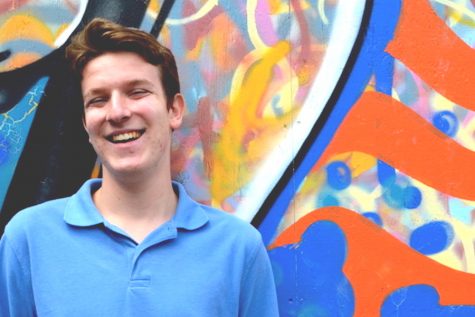
Tobey Lee joined Boiling Point his freshman year, writing award-winning stories about the boys basketball team and delving into the intricacies of the California Interscholastic Federation. From there, he became Sports Editor as a sophomore and he is now the editor of the Features section. Aside from BP, Tobey enjoys singing bass in the choir, hanging out with friends and spending time with his family.
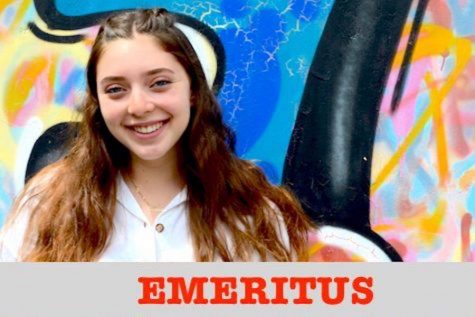
Lucy Fried was co-editor-in-chief during the 2018-19 school year and went on to study at the Hartman Institute in Jerusalem. She is now a junior at UC Berkeley.

